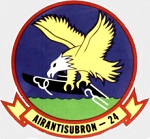Hobby Master HA4906 US Navy Lockheed S-3A Viking Anti-Submarine Aircraft - VS-24 "Scouts," 1978 (1:72 Scale)
"The S-3 was a unique program. We went from first contract to first contact over a submarine in just three years."
- Lockheed Executive Vice President Tom Burbage, who flew the Viking as a Navy test pilot and later ran the S-3 program for the company
 The Navy began what became the S-3 Viking program in 1964 to replace the piston-powered S-2 Tracker. Known originally as VSX - for "carrier-based antisubmarine warfare aircraft-X" - a formal request for proposal was issued in April 1968. A joint General Dynamics-Grumman team and the then-Lockheed Aircraft Corp. were chosen from among the competitors to refine their proposals.
The Navy began what became the S-3 Viking program in 1964 to replace the piston-powered S-2 Tracker. Known originally as VSX - for "carrier-based antisubmarine warfare aircraft-X" - a formal request for proposal was issued in April 1968. A joint General Dynamics-Grumman team and the then-Lockheed Aircraft Corp. were chosen from among the competitors to refine their proposals.
Although Lockheed had four decades of land-based antisubmarine warfare experience dating back to the World War II-era Hudson, the company had only built one carrier-based aircraft to that point, the T2V-1 SeaStar trainer. To build a strong Navy-oriented team, Lockheed first brought on LTV Aerospace, formerly Vought, with its long history in carrier aviation, as a partner. Then the Federal Systems Division of Sperry Rand was added to develop the aircraft's computerized acoustic detection system, a first for an airborne antisubmarine warfare platform.
The Lockheed team was declared the winner of the VSX competition on August 4th, 1969. One of several speakers at the 2009 retirement ceremony was current Lockheed Martin F-35 Executive Vice President Tom Burbage, who flew the Viking as a Navy test pilot and later ran the S-3 program for the company. He noted that "the S-3 was a unique program. We went from first contract to first contact over a submarine in just three years."
Pictured here is a 1:72 scale replica of a US Navy Lockheed S-3A Viking anti-submarine aircraft that was attached to VS-24 "Scouts," during 1978.
Sold Out!
Dimensions:
Wingspan: 9-inches
Length: 11-1/2-inches
Release Date: May 2017
 Historical Account: "Controlling the Sea" - Sea Control Squadron TWENTY-FOUR (VS-24) exists to support the accomplishment of the Navy's missions of forward presence, power projection, sea control, and on-scene crisis response. Specifically, VS-24 provides the operational commander with advanced command and control, surveillance, and battle space dominance. The Scouts accomplish this by ensuring the highest state of readiness and providing an all-weather sea strike and sea control platform that is highly capable in all warfare areas. Sea Control Squadron TWENTY-FOUR is an integral element to the successful execution of Anti-Surface Warfare, Electronic Warfare, Over the Horizon Targeting, Counter Targeting, and Organic Refueling.
Historical Account: "Controlling the Sea" - Sea Control Squadron TWENTY-FOUR (VS-24) exists to support the accomplishment of the Navy's missions of forward presence, power projection, sea control, and on-scene crisis response. Specifically, VS-24 provides the operational commander with advanced command and control, surveillance, and battle space dominance. The Scouts accomplish this by ensuring the highest state of readiness and providing an all-weather sea strike and sea control platform that is highly capable in all warfare areas. Sea Control Squadron TWENTY-FOUR is an integral element to the successful execution of Anti-Surface Warfare, Electronic Warfare, Over the Horizon Targeting, Counter Targeting, and Organic Refueling.
Throughout the years, VS-24 has flown five different types of aircraft from fifteen aircraft carriers. The last airframe change for the Scouts occurred in August 1975 when the squadron transitioned from the prop-driven S-2G Tracker to the turbofan S-3A Viking. The squadron upgraded to the S-3B in September 1989. This modification added the capability to launch the Harpoon missile, added Inverse Synthetic Aperture Radar (ISAR), provided the ability to deploy electronic countermeasures and aerial refuel other aircraft, and improved the Electronic Surveillance Measures (ESM) and acoustic detection systems.
Sea Control Squadron TWENTY-FOUR traces its history back to January 1st, 1943, when it was commissioned as Bombing Squadron SEVENTEEN (VB-17). The squadron embarked aboard USS BUNKER HILL (CVS-17) and USS HORNET (CVS-12) for action throughout World War II. The post-war period was one of great changes for the squadron. Its designation and tasking changed several times until April 8th, 1960, when it was designated Air Anti-Submarine Squadron TWENTY-FOUR and assigned the Anti-Submarine (ASW) mission. In 1993, the squadron was redesignated Sea Control Squadron TWENTY-FOUR, which reflected the new multi-mission role of the Viking aircraft.






![USMC Boeing AV-8B Harrier II Jump Jet - VMA-231 "Ace Of Spades", Operation Desert Storm, 1991 [Low-Vis Scheme] (1:72 Scale)](http://cdn4.volusion.store/qh9e9-jdqv9/v/vspfiles/photos/HA2614-1.jpg?v-cache=1740197136)
![USN Douglas SBD-5 Dauntless Dive-Bomber - Lt. Cook Cleland, "White 39," VB-16, USS Lexington (CV-2), June 1944 [Dive Brakes Up] (1:72 Scale)](http://cdn4.volusion.store/qh9e9-jdqv9/v/vspfiles/photos/HA0170-1.jpg?v-cache=1740197136)

